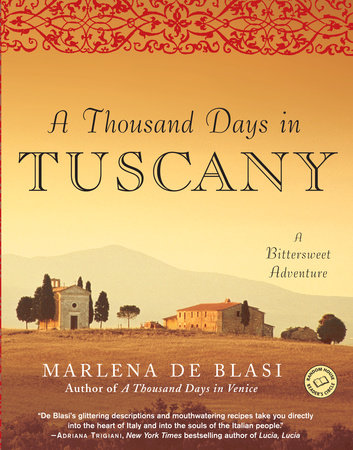A Thousand Days in Tuscany Reader’s Guide
By Marlena de Blasi


1. This book is titled A Thousand Days in Tuscany:A Bittersweet Adventure. What do you consider to be the “bittersweet adventure” of the subtitle? What would you call a book that chronicled the past thousand
days of your life?
2. San Casciano is itself a living, breathing character in the book. What is your most vivid impression of the town? How is it similar to, or different from, impressions you had about Tuscany prior to reading this book?
3. How do the author and her husband adjust to living in the rustic world of San Casciano? What does de Blasi see as the most rewarding and challenging aspects of this new life? In your view, what would be most appealing about living a similar existence in a simple, rural town? What would be the most frustrating?
4. How does de Blasi reconcile the tension that sometimes exists between “the simple life” and the march of progress, especially as she acclimates to her new environment? How do the villagers respond to this conflict—of “tradition versus the new”—in their own ways? Have you ever struggled with a similar tension in your life?
5. The author has said that this book is a companion piece to A Thousand Days in Venice. How does the book function as one standalone memoir, and how does it provide another piece in the puzzle of the author’s life? Do you think all readers would benefit from reading these books in tandem? If you’ve read both books, does de Blasi’s mindset change from one to the next, with her change in location?
6. A Thousand Days in Tuscany is separated into sections delineated by season. Discuss this organizational technique. How does the framework of the book mirror the way that rural Tuscan life unfolds? Could you imagine this book organized in any different way?
7. On page 99, de Blasi writes, “Right now all I know is that in love there must be some form of desperation and some form of joy.” Do you agree or disagree with this idea? How is this statement exemplified by the relationships in the book, particularly the one that de Blasi shares with her husband and the one between Barlozzo and Florìana?
8. De Blasi develops a passionate relationship with the land itself. Why does she so enjoy the grape and olive picking she becomes a part of during the course of the book? What connection does this give her to the earth? What activities do you enjoy that might impart that same sort of feeling?
9. “Both my clothes and I are survivors of some other time,” says de Blasi on page 133. How do the clothes that the author chooses to wear evoke her personality and character? Why does she choose to wear one particular ensemble per season?
10. How does de Blasi’s discussion of food throughout this memoir impact your understanding of her life? Do you plan to try any of the recipes that the book includes?
11. Why do de Blasi and Fernando nickname Barlozzo “the duke”? Why do you think Barlozzo immediately takes de Blasi under his wing? What characteristics do the two share? How does Barlozzo’s counsel and involvement shape the life that de Blasi and Fernando construct in San Casciano?
12. How does Barlozzo’s story about his past give clues about the formation of his adult personality? Ultimately, how is he constrained by the ghosts of his parents, and how is he able to triumph over them? Have you ever felt a similar struggle with the past?
13. What about Florìana was so compelling, and to the author and Barlozzo in particular? Why do you think she was so private about her illness? How did her fellow villagers respect her need for privacy and, ultimately, for companionship?
14. The note that Florì leaves for Barlozzo reads, “I wanted death to find me dancing.” How does Florì’s attitude about death mirror the one she holds about life? If you needed to leave someone a similar note at the end of your life, what would it say?
15. In which ways are de Blasi and Fernando a study in how “opposites attract”? How do their different personalities and cultures play a part in their relationship? How are the two similar, both in their approach to their relationship and to their new life in San Casciano? How does their relationship evolve during their time in Tuscany?
16. De Blasi tells Misha that security “is a myth.” Do you agree with her statement? What prompts Misha’s concern about his friends’ safety and security? Do you think that Misha fears change? Why? Does de Blasi value “risk more than comfort,” as Barlozzo contends? What is the largest risk you’ve taken in your life? How was it rewarding?
Just for joining you’ll get personalized recommendations on your dashboard daily and features only for members.
Find Out More Join Now Sign In